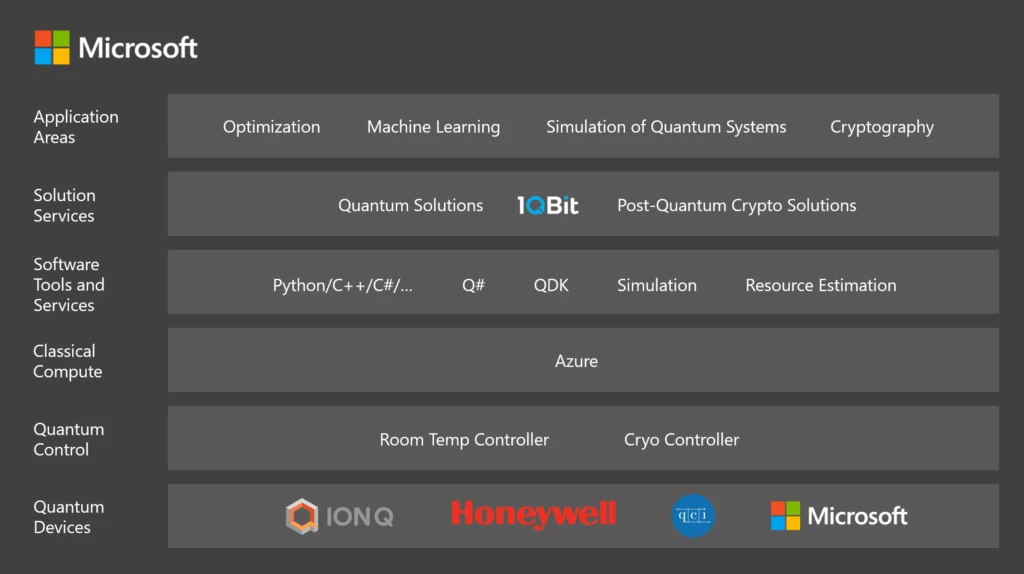 EMERGING TECH
EMERGING TECH
 EMERGING TECH
EMERGING TECH
 EMERGING TECH
EMERGING TECH
Microsoft Corp. took the wraps off of its quantum computing strategy today, announcing an upcoming service called Azure Quantum that aims to mix and match the best bits of classical computing with the new architecture.
“With all the capacity we have around computing, we still have many unsolved problems, whether it’s around food safety, or climate change, or the energy transition,” Microsoft Chief Executive Officer Satya Nadella said in a keynote at Microsoft’s Ignite conference today. “These are big challenges that need more computing. We need general-purpose quantum.”
Quantum computers can perform calculations many, many times faster than traditional machines, which deal in binary bits of ones and zeroes. Quantum computers work by taking advantage of some weird physics to process quantum bits, better known as qubits, that can represent a one, a zero, or both states at the same time.
Microsoft is one of several big tech companies that have been researching quantum computing for years, and it previously announced several aspects of its strategy. Earlier this year, for example, it unveiled its Q# programming language for quantum computing, as well as a Quantum Development Kit, to help developers create their first quantum applications.
Azure Quantum will be launched in private preview in “the coming months,” Microsoft said. The existing Microsoft Quantum Network, which is a coalition of partners, universities, customers and developers interested in quantum computing, will serve as a forum for those wishing to discuss their research using the service.
Azure Quantum will provide cloud-based access to a range of quantum hardware from Microsoft’s partners. Those will include startups such as IonQ Inc. and Honeywell International Inc., which are developing quantum hardware that uses trapped ions, and Quantum Circuits Inc., which uses a kind of Lego-like assembly of superconducting circuits. The service will also provide access to Microsoft resources such as Q# and QDK.

In his keynote, Nadella said Azure Quantum would be based on a “quantum on classical” approach that involves using quantum tools alongside classical computers to optimize algorithms that can solve various complex problems.
Holger Mueller of Constellation Research Inc. said it was key that Microsoft has a quantum computing product, as quantum technologies are likely to be one of the first provided solely in the cloud.
“It means a lot of load will connect to quantum, and of course a vendor like Microsoft does not want to miss out,” Mueller said. “It’s interesting that Microsoft is partnering here with IonQ and Honeywell instead of using in-house development. The focus for Microsoft, for now at least, seems to be on the software platform and workload capture side.”
“I like Microsoft’s approach to quantum computing so far given that it’s based on open hardware and software,” added Patrick Moorhead of Moor Insights & Strategy. “I’m very pleased to see it is working with Honeywell, which I believe could be the dark horse in this game.”
Microsoft’s quantum service will rival similar cloud-based offerings from D-Wave Systems Inc., IBM Corp. and Rigetti Computing Inc.
The launch of Azure Quantum comes at a time when some of Microsoft’s rivals are making solid progress themselves. For example, Google announced just last month that it had finally achieved “quantum supremacy,” meaning that its latest 54-qubit Sycamore quantum processor can perform calculations too difficult for even the most sophisticated of classical machines, though rivals such as IBM threw some cold water on the claim.
Support our mission to keep content open and free by engaging with theCUBE community. Join theCUBE’s Alumni Trust Network, where technology leaders connect, share intelligence and create opportunities.
Founded by tech visionaries John Furrier and Dave Vellante, SiliconANGLE Media has built a dynamic ecosystem of industry-leading digital media brands that reach 15+ million elite tech professionals. Our new proprietary theCUBE AI Video Cloud is breaking ground in audience interaction, leveraging theCUBEai.com neural network to help technology companies make data-driven decisions and stay at the forefront of industry conversations.